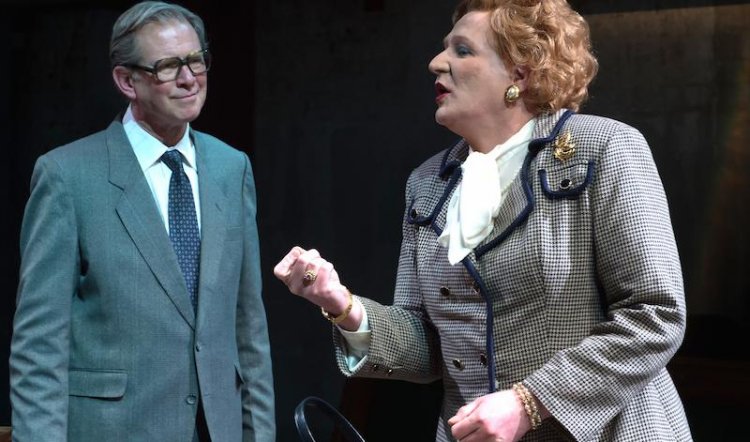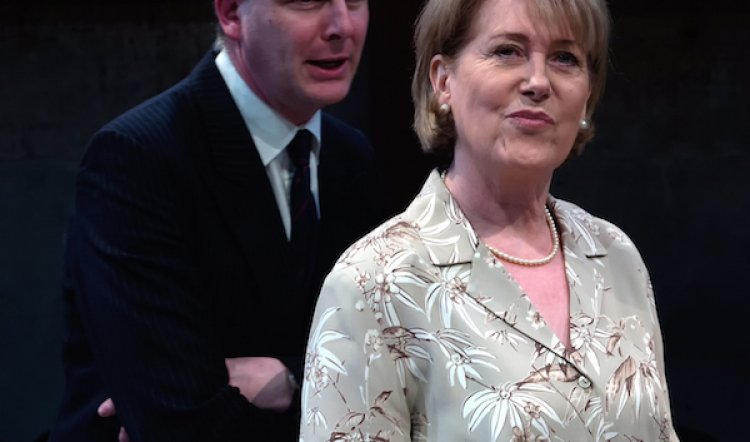
DEAD SHEEP
DEAD SHEEP, Cahoots Theatre Company in association with Park Theatre at the Park Theatre, Finsbury Park, London N4 3JP, 2 April-9 May 2015. Photography by Bill Knight: James Wilby and Steve Nallon; right: Jill Baker and Tim Wallers.
The two-year-old, £2.5m theatre-cafe-bar purpose-built into an old office block in north London won The Stage’s Fringe Theatre of the Year for 2015, and no wonder. It’s also had some spectacular successes so far with shows touring and transferring and being praised by critics and audiences alike.
And, as it happens, the tall, two-tiered rectangular space works well for Dead Sheep. It’s designed and played in the round (rectangle, actually) directed with a light hand and good eye by Ian Talbot, sparely designed by Morgan Large and lit with similar finesse by David Howe.
The set instantly signals our location with a front row of seating in the unmistakeable green leather and mellow timber of the House of Commons front bench. Unlike those usually seated upon it, however, audience members do not burp, snore, slouch nor bleat encouragement to colleagues. And when Mrs Thatcher (Steve Nallon) enters there’s a perceptible stiffening of spines and neatening of feet in Row A.
Dead Sheep is the first play from former BBC reporter and author of amusing books Jonathan Maitland. It’s set in 1990 when the important and longstanding “benign synthesis” between British prime minister Margaret Thatcher and her Foreign Secretary Geoffrey Howe (James Wilby) was about to shatter. Written as a docu-drama with comedy inevitably sprinkled on top, Dead Sheep is gleaned from public and parliamentary speeches and the copious memoirs and revenge tales of the era’s chief protagonists.
The title, for those who weren’t around or who were but have since forgotten, is taken from an observation made in parliament in 1978 by Labour’s Chancellor of the Exchequer (Treasurer) Dennis Healey. He was responding to a typically fluffy attack from mild-mannered Tory shadow minister Geoffrey Howe. And it’s worth recalling all of Healey’s typically fruity response when he said, “…after ploughing through that tedious and tendentious farrago of moth-eaten cuttings presented to him by the Conservative research department… I must say that part of his speech was rather like being savaged by a dead sheep.”
By 1990, however, Howe had long ago crossed from the opposition to the government benches and become Thatcher’s treasurer and then foreign secretary and – fatally for his career – a Europhile in a party of Eurosceptics that was led by the most sceptical of all. And also by 1990, Margaret Thatcher had crossed from relatively normal to the higher realms of hubris and hyperbole: her arrogance and self belief were breathtaking. It was she, lest we forget, who once said – on the steps of 10 Downing Street – in announcing the birth of her daughter’s first child, “We are a grandmother.”
That it should be the loyal-to-a-fault Geoffrey Howe, then, who would finally give her the shove down the slippery slope of her own making was an irony – and the one Maitland exhumes and explores in Dead Sheep. It’s also the tale of two women, according to the playwright, as the redoubtable Elspeth Howe (Jill Baker) shores up her somewhat diffident husband and finally manages to send him over the top and out of the trenches with fixed bayonet.

Although a staunch Tory, Elspeth Howe was a working woman (and at one time – exquisite irony – deputy chief of the Equal Opportunities Commission). She was also socially progressive and humane – things that could never be said of Thatcher – and according to Maitland, the two women clashed from the earliest times.
Vital in making this part of the drama credible, Steve Nallon is an extremely fine and believable Thatcher. Although he voiced her in the hit TV series Spitting Image, his portrayal is not exaggerated – no more so than the real thing at any rate. He absolutely captures the stance, the raptor-ish walk and the artificially benign demeanour that made the breathily modulated voice so menacing. As well as the dully gentle Howe, she was surrounded by yes men – or she turned them into yes men – and was famously the only man in the cabinet. (But she would not have worn the ill-tailored and ratty op shop two piece suit in which she’s unfortunately kitted out.)
The fabled story is told in 120 minutes, including interval, of mainly sharp dialogue and well drawn characters. As well as the core cast members there is Graham Seed as Ian Gow and Nigel Lawson, John Wark as Stephen Wall and Bwyan Walden and – spectacularly – Tim Wallers as the vile Alan Clark and equally vile Bernard Ingham. (You’ll have to check back over a few volumes of diaries and memoir if you can’t remember who they are; it would be worth it, by the way.)
The first half is strong and rackets along in Thatcher’s wake in a highly entertaining and illuminating fashion. The 30-minute second act sags somewhat and, paradoxically, Howe’s killer speech isn’t exactly Jurassic Park, perhaps because the build-up and anticipation have been too much. Perhaps too, because in this age of the three word slogan and the 17-second sound bite, an erudite and subtle speech of nuance and stiletto wickedness is too hard to grasp. The author also succumbs to a soppy ending and that’s the least believable few minutes of the evening.
Nevertheless, Dead Sheep is mostly illuminating, engaging and a valuable contribution to the theatre of recent history and appalling political figures.



